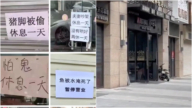【新唐人2014年08月21日讯】近几年,中国房地产泡沫即将破灭的预言不绝于耳,一座一座的“空城”、“鬼城”随处可见,但工薪阶层和蜗居地下室、以及城市地下井的底层民众,面对高昂的房价只能望而却步。为了实现“居者有其屋”,日前,中国民间人士发起了占房运动。
8月中旬,北京宪政学者陈永苗、香港《太平洋月刊》总编辑欧阳劲、北京季先生、宁波民间人士佘祯韬以及山东民间人士乔小飞、徐宁康等人,来到山东烟台福山区派出所对面的“鬼城”——福地尚苑小区,展开了首次占房运动。
20号,陈永苗在接受《新唐人》采访时表示,他们的首轮占房运动已结束,接下来将开展第二轮。他认为,中国几十年的经济发展,几乎所有的社会问题,民生问题都是以房子为中心,他们希望通过“占房运动”,让居者有其屋。
北京宪政学者陈永苗:“我们好多人一辈子打工赚的钱都花在房子上,可能大部分人还是房奴,所以将来如果说爆发社会革命运动,它还是以房子为中心来爆发的,所以我觉得我们应该提前来预备准备这项工作,而且在中国大量进入城市,被城市化的很多的农民工、蚁族,他都需要有房子。”
但是,那些工薪阶层以及蜗居在地下室和城市地下井的贫困群体 ,面对高昂的房价只能望而却步。而富裕阶层和权贵们囤积多处房产,长年闲置。陈永苗表示,从这个意义上来讲,占房运动是对底层民众权益的救济方式。
香港独立研究机构“剖析中国”的创办人之一塔洛克曾指出,中共各级政府大力招商引资的开发区,像是河南省郑州市郑东新区、内蒙古的鄂尔多斯等新市镇,充满着无人办公与居住的大楼建筑。这些楼房几乎都卖给了中产阶级,他们却很难顺利脱手。这种充斥着“有人买、没人住”的新兴城市,中国每年还会持续增加12到24个。
另一方面,中国底层百姓不仅买不起住房,为了配合当局“推进城镇化”的脚步,还必须让出自己房屋,沦为无房户或蜗居者。陈永苗指出,即便数以千万计的底层民众想尽快拥有自己的房产,但他们也买不起。
陈永苗:“它很多的房价是为政府买单的,它实质上是一个显示公平或不公平的一种契约,所以需要一种社会运动来校正这种社会争议,校正这种社会不正义,校正这种财产掠夺的行为。”
大陆经济学者温克坚曾刊发文章,呼吁“年轻人,去占领那些荒漠鬼城”,他认为,占房运动对一个结构固化,大量住房资源处于闲置和浪费状态的社会,可以说是一种可供选择的反抗机制。
陈永苗:“我们现在占的主要是想占‘鬼城’,没人住的‘鬼城’﹔还有一个想发动群众去占贪官房子;第三个,房奴 ,他不是碰到经济危机,他下岗了他就没钱了,他就要被银行把房子收走,这种房子我们觉得也应该是要支持他们,房子要占领嘛。”
陈永苗表示,占房运动只占使用权,不占所有权。大陆维权律师唐吉田表示,从法律角度讲,这种运动不构成犯罪,还能对社会分配正义和住房不公起到自发矫正的作用。
大陆维权律师唐吉田:“风险的话,最多可能会被罗织一些罪名,或者是舆论上的抹黑,或者其他一些方法对群众一些压制,当然目前我了解的情况还没有实际上的这种反应,可能还取决于后续的规模和波及面。”
陈永苗披露 ,目前他们已有一个100多人的占房运动群,接下来他们会建一个占房运动网,然后成立一个律师团,如果真有人因占房被抓可以做辩护。
记者编辑/李韵 后制/钟元
Ghost Towns are everywhere in China
People Launch Occupancy Campaign
In recent years, the prophecy of the China real estate bubble
burst is never ending, the empty ghost towns are everywhere.
However, the working-class grassroots people who are
living in the urban underground have to prohibitively
face the high real estate price.
To achieve the home ownership, recently, Chinese civil
people initiated the occupancy movement.
In mid-August, Beijing constitutional scholar Chen Yongmiao,
Hong Kong Pacific Magazine editor Ou Yangjin, Mr. Ji in
Beijing, Ningbo SHE Zhentao and Shangdong Qiao Xiaofei,
Xu Ningkang launched its first occupancy movement at the
ghost town facing the Fushan police station in Yantai.
August 20, Chen Yongmiao told NTD that they will start
the second round occupancy campaign because the
first round has ended.
He believes that almost all social problems, livelihood issues
from China’s economic development of the last decades
are house-centered.
They hope to realize home ownership
through occupancy movement.
Chen Yongmiao: lots of people still become mortgage slaves
even though they have been working a lifetime for their house.
So if the social revolutionary movement outbreaks in the
future, it might be still house-centered.
I think we should prepare in advance.
Plus in China, lots of urbanized farmers and tribes need
houses after having migrated to the city.
However, those working-class and poor people in the basement
and urban underground wells are still prohibitive in facing
high house prices.
The wealthy and powerful people have been hoarding many idle properties for a long time.
Chen Yongmiao said the occupancy movement is the remedy
to underlying public interests.
One of Hong Kong’s independent research institution founder’s
Tulloch has pointed out that the development zones are
invested in because of each government’s promotion, are full
of empty office buildings and houses.
These include Zheng Dong New Area in Henan Province and a
new town in Ordos in the Inner Mongolia.
These buildings are almost sold to the middle class, but they
find it difficult to sell.
In China, such purchased but unoccupied new cities will
continue to increase by 12 to 24 per year.
On the other hand, the underclass cannot afford housing and
become homeless or accept a small flat by conceding their own
houses to cooperate with the authorities on urbanization.
Chen Yongmiao pointed out that even if tens of millions of
underclass want to own their own property as soon as possible,
they still cannot afford it.
Chen Yongmiao: The government actually pay the bill
for real estate.
It is an actual contract to show that it’s fair or unfair.
So we need a social movement to correct such social
controversy and the property predatory behavior.
Mainland economist Wen Kejian has published articles calling
on the young people to occupy those empty ghost town.
He believes, the occupancy movement is a selective resistance mechanism to act against a large idle and wasted
housing resources in state.
Chen Yongmiao: We mainly occupy the ghost town, the
unoccupied ghost town.
We also want to mobilize the masses to occupy
the corrupt houses.
Thirdly, we should support mortgage slaves who are homeless
because they were laid off and lost their houses to the banks.
Chen Yongmiao said the occupancy movement would only take
the user’s right not the ownership.
Mainland human rights lawyer Tang Jitian said, from a legal
point, this movement does not constitute a crime but also
corrects the social injustice and unfair
housing allocation spontaneously.
Mainland human rights lawyer Tang Jitian: the most risks
might be some trumped up charges, discrediting by public
opinion, or some other way for massive repression.
Of course, based on my current understanding, there is no such
reaction so far.
It might depend on the subsequent scale and affect.
Chen Yongmiao disclosed that they have more than 100
people to participate in the occupancy movement.
Then they will construct a website for the movement and set
up a lawyer team in case someone is arrested because
of the movement.
Interview & Edit/LiYun Post-Production/ZhongYuan





























